Sao Tome sanction puts Mauritius in Afcon qualifierspublished at 11:20 BST 16 May 2022
Mauritius will play in the group stage of 2023 Africa Cup of Nations qualifiers after Sao Tome are sanctioned for fielding an ineligible player.
Read MoreMauritius will play in the group stage of 2023 Africa Cup of Nations qualifiers after Sao Tome are sanctioned for fielding an ineligible player.
Read MoreThe Nigeria Football Federation agrees terms with former Porto and Sporting Lisbon boss Jose Peseiro to take charge of the national team.
Read More Ishaq Khalid
Ishaq Khalid
BBC News, Abuja
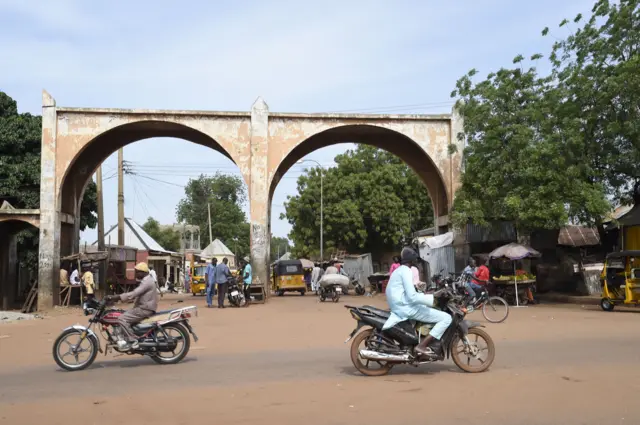 Image source, Getty Images
Image source, Getty ImagesThe authorities have relaxed the curfew in Sokoto city (file photo)
Authorities in the north-western Nigerian state of Sokoto have relaxed the 24-hour curfew imposed on the state capital following violent protests on Saturday. But a night-time shutdown is still in place.
Hundreds of Muslim demonstrators had taken to the streets demanding the release of suspects arrested in connection with the killing of a Christian student accused of blasphemy against Islam.
But the protests turned violent amid burning of tyres on the streets, looting of shops and blocking of major roads before police fired tear gas to disperse the crowds.
State governor Aminu Tambuwal then declared a round-the-clock curfew in Sokoto city where the demonstrations took place.
But in a statement, Sokoto state official Isah Bajini Galadanci, says the 24-hour curfew has been relaxed following a review of the security situation.
The curfew will now take effect from dusk to dawn, to enable people ‘"pursue their legitimate businesses and other means of livelihood".
The state government has however called on people to remain peaceful, warning that it "will not condone any breach of law and order".
Police in Kenya have arrested a man and two accomplices suspected of killing a 19-year-old female college student.
Kenyans online have been calling for justice for Purity Wangechi, whose body was discovered on Saturday morning with visible stab wounds and strangulation marks by a roadside near the capital, Nairobi..
The Directorate of Criminal Investigations (DCI) on Sunday said they had arrested her ex-boyfriend – who is suspected of having committed the brutal killing.
The two alleged accomplices are accused of assisting him dispose of the body.
The DCI said Ms Wangechi “had fallen in love with the [suspected] killer and they had been in a relationship for some time”.
It said a misunderstanding arose between them when she confronted him over his behaviour.
The police said they recovered a kitchen knife that may have been used in the killing.
A hashtag, #justiceforwangechi, has been trending on Twitter in Kenya, with many people mourning her death and asking for prompt justice.
Allow X content?
This article contains content provided by X. We ask for your permission before anything is loaded, as they may be using cookies and other technologies. You may want to read X’s cookie policy, external and privacy policy, external before accepting. To view this content choose ‘accept and continue’.
 Kennedy Gondwe
Kennedy Gondwe
BBC News, Lusaka
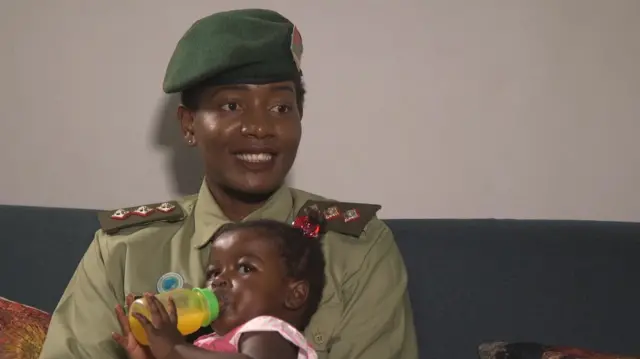 Image source, BBC / Kennedy Gondwe
Image source, BBC / Kennedy GondweZambian army Captain Mwila Chansa has spoken of her battle to adopt a baby she first met while on deployment as a UN peacekeeper in the Central African Republic.
The baby girl's mother was pregnant with twins, but developed a complication and died after giving birth to the first baby in November 2020. The second child died before birth.
Captain Chansa visited Birao, near the border with Sudan and Chad, in March 2021 when she heard the story of the baby - who was by then under the care of a nurse in the Zambian camp.
She made a decision to adopt it, but the bureaucracy turned into a long and laborious process in navigating the country’s Islamic law.
"I went to Google, trying to look up how to adopt a child from CAR. All the information was about USAid and how easy it is for Americans generally to adopt children. But there was nothing in regards to a Zambian adopting a child there," she told the BBC.
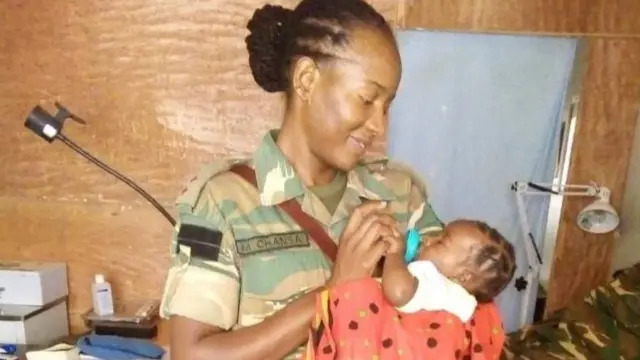 Image source, Mwila Chansa
Image source, Mwila ChansaThe captain said her "deep conviction" saw her "fight tooth and nail" to "engage the powers that be until the baby was here [Zambia's capital, Lusaka]".
"It just reminds me so much of the story of the biblical Moses,” she said.
“Adopting a child is like falling in love. You see so many men or so many women but you only choose one."
Zambian President Hakainde Hichilema heralded Captain Chansa for demonstrating humanity in her work.
The presidential approval invited more attention.
“I woke up, my phone was buzzing. I was wondering what was going on?” she said.
She has big ambitions for her baby daughter who she named Thabo.
“I would wish for her to be the president of the Central African Republic. I say that without flinching,” she said.
Morocco's Renaissance Berkane will take on South Africa's Orlando Pirates in Friday's final of the Confederation Cup.
Read MoreSabrina Dhowre Elba visits Somalia and Kenya on behalf of the International Fund for Agricultural Development.
Read MoreMohamud Ali
BBC Planning Editor, East Africa
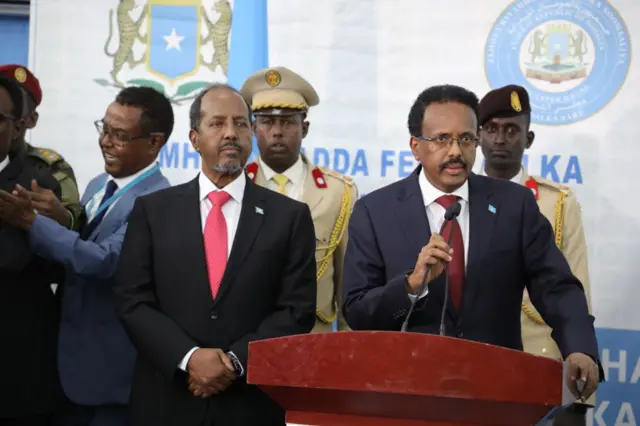 Image source, AFP
Image source, AFPHassan Sheikh Mohamud (L) makes a comeback having served as Somalia's eighth president
There were huge celebrations in Mogadishu as residents welcomed the election of the new Somalia President Hassan Sheikh Mohamud.
Somalis living in Nairobi, in neighbouring Kenya, also welcomed the news with celebrations.
Mr Mohamud won with 214 votes in a third round of voting against the incumbent Mohamed Abdullahi Farmajo, who got 110 votes.
He was sworn in shortly after the final results were announced and will serve for the next four years.
Neighbouring countries such as Ethiopia were quick to congratulate the new president. More international reaction is expected during the day.
Mr Mohamud makes a comeback having served as Somalia's eighth president from 2012, before Mr Farmajo defeated him in the 2017 elections.
The returning president inherits a country facing key challenges such as drought, insecurity and the rising cost of living.
 BBC Monitoring
BBC Monitoring
The world through its media
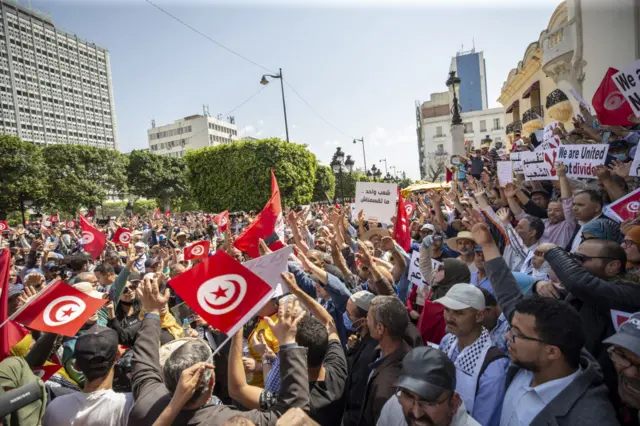 Image source, Getty Images
Image source, Getty ImagesThousands of Tunisians took part in demonstrations against the president
Thousands of Tunisians took to the streets in the capital, Tunis, on Sunday to protest against President Kais Saied's political measures and rising food prices.
A co-ordinator from the Citizens against the Coup coalition – one of the protest organisers – told the state broadcaster that they rejected the country's "new constitution" that was "drawn up unilaterally" by Mr Saied.
Islamist Ennahda Movement official Ali al-Arid told the channel that protests would continue in the form of sit-ins, marches and hunger strikes.
The protesters assembled on central Tunis thoroughfare chanting the slogan "Leave", state news agency TAP reported.
It also published photos of the crowds waving Tunisian flags and loaves of bread, a reference to rising food prices.
Mr Saied has pushed through a series of moves expanding his powers and dismantling elected institutions since last year, when he suspended parliament.
Earlier this month, he announced a plan for a "new republic" in Tunisia which would be put to referendum on 25 July.
World leaders have been tweeting congratulatory messages to Somalia's new President Hassan Sheikh Mohamud for his win in Sunday's election.
Mr Mohamud, who served as Somalia's president between 2012 and 2017, won after a third round of voting by Somalia's 328 MPs. He was sworn in soon after.
The outgoing president, Mohamed Abdullahi Farmajo, has urged Somalis "to support and pray for the success" of the new president.
Allow X content?
This article contains content provided by X. We ask for your permission before anything is loaded, as they may be using cookies and other technologies. You may want to read X’s cookie policy, external and privacy policy, external before accepting. To view this content choose ‘accept and continue’.
The Prime Minister of neighbouring Ethiopia, Abiy Ahmed, has said he looked forward to working with the new president on regional interests.
Allow X content?
This article contains content provided by X. We ask for your permission before anything is loaded, as they may be using cookies and other technologies. You may want to read X’s cookie policy, external and privacy policy, external before accepting. To view this content choose ‘accept and continue’.
Somalia-born US congresswoman Ilhan Omar said the Somali people were all winners in the elections.
"The country needs all of you to work together as it moves forward from decades of instability," she tweeted.
Allow X content?
This article contains content provided by X. We ask for your permission before anything is loaded, as they may be using cookies and other technologies. You may want to read X’s cookie policy, external and privacy policy, external before accepting. To view this content choose ‘accept and continue’.
The European Union ambassador to Somalia also tweeted her congratulations.
Allow X content?
This article contains content provided by X. We ask for your permission before anything is loaded, as they may be using cookies and other technologies. You may want to read X’s cookie policy, external and privacy policy, external before accepting. To view this content choose ‘accept and continue’.
The UK's Minister for Africa, Vicky Ford, said she was looking forward to her government "continuing its close work to support on building stability, tackling al-Shabab and supporting those affected by the devastating drought" in Somalia.
Allow X content?
This article contains content provided by X. We ask for your permission before anything is loaded, as they may be using cookies and other technologies. You may want to read X’s cookie policy, external and privacy policy, external before accepting. To view this content choose ‘accept and continue’.
The country's ambassador to Somalia also tweeted her congratulations., external
 Nicolas Negoce
Nicolas Negoce
BBC News
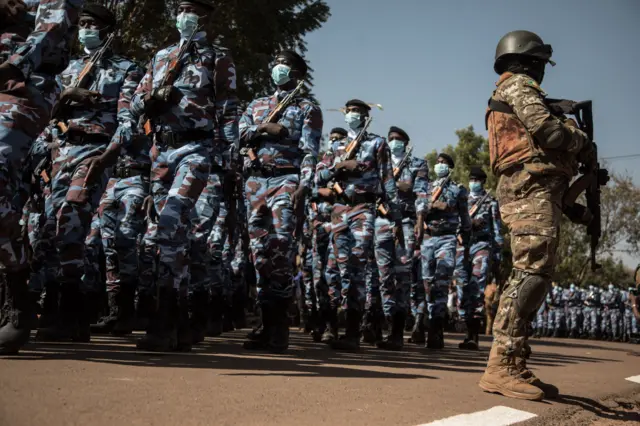 Image source, AFP
Image source, AFPThe Malian junta has complained of a lack of progress in the fight against Islamists
Mali is pulling out of a multinational military force fighting Islamist militants in West Africa's Sahel region.
Mali said on Sunday that this was a protest against its rejection as head of the G5 regional group that also includes Mauritania, Chad, Burkina Faso and Niger.
The statement by Mali's junta, which ousted former President Ibrahim Boubacar Keïta in a 2020 coup, also blamed a lack of progress in the fight against the militants and the failure to hold recent meetings in Mali.
The force was set up in 2017 to counter jihadists who have swept across the region in recent years, killing thousands of people and forcing millions to flee their homes.
But it has been hobbled by a lack of funding and has struggled to reduce the violence.
There has been no comment yet from other G5 members over Mali's announcement.
Mali's withdrawal could further isolate the country whose economy has been hit by sanctions since the coup.
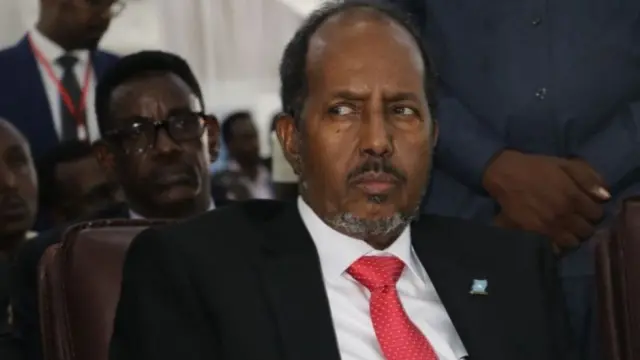 Image source, Getty Images
Image source, Getty ImagesSomalia's new President, Hassan Sheikh Mohamud, has said he will try to move his country forward by healing the grievances which run through Somali society.
Mr Mohamud is the first man in the country's history to win back the presidency after being voted out of office, but he faces a daunting in-tray at the start of his second term: Somalia has been crippled by years of Islamist insurgency and is currently being ravaged by a severe drought.
"We have to move ahead, we do not need grudges. No avenging," Mr Mohamud is quoted as saying by the Reuters news agency.
His election in a vote delayed by over a year means a $400m (£327m) aid package from the International Monetary Fund now won't automatically expire this month.
Our proverb of the day:
Quote MessageA woman is the belt that holds up her husband's trousers."
A Beti proverb sent by Sandrine Mengue Essomba in Yaoundé, Cameroon.
Your Place Or Mine is the travel podcast that isn’t going anywhere - not until guests can convince Shaun Keaveny it’s worth getting off the sofa for. Each week a familiar face will try to persuade Shaun and resident geographer, historian and comedian Iszi Lawrence that jetting off to their favourite destination is worth the hassle.
Across the series listeners will be able to figuratively globe-trot to a new destination, as guests share a personal guide to their favourite place on the planet. Iszi will be on hand to check out the facts during the podcast’s metaphorical tour of its visitors’ much-loved locations.
In this episode, comedian Daliso Chaponda pitches a trip to his favourite ‘beautiful, backward place’: Lilongwe in Malawi. Safaris, stillness and starry skies beckon Shaun - but what about the Black Mambas?
With all the missed travel these past two years, Your Place Or Mine will explore whether getting back on a plane is too much for our wallets and limited carbon budgets, or if seeing the world and experiencing global cultures is something we can’t afford to miss.
Your Place or Mine is a BBC Audio production for BBC Radio 4 and BBC Sounds.
Producers: Proinsias O’Coinn and Jen Whyntie
At its height, the Aksumite Empire extended across the northern Ethiopian and Eritrean highlands, and even included parts of Sudan, Somalia and modern-day Yemen. From the first century BC to the seventh or eighth centuries AD it was one of the most important trading hubs in north-east Africa. It was also one of the earliest states in the world to adopt Christianity. In fact the Persian prophet Mani named the Aksumite Empire as one of the “four great kingdoms on Earth” together with Persia, Rome and China. But despite its power and reputation, we’re only now beginning to understand more about the lives of the people who lived there.
Joining Bridget Kendall to discuss the Aksumite Empire and its legacy are Helina Solomon Woldekiros, Assistant Professor of Archaeology at Washington University in St Louis, Missouri; Felege-Selam Solomon Yirga, Assistant Professor of History at the University of Tennessee; and Dr. Niall Finneran, Reader in Historical Archaeology and Heritage Studies at the University of Winchester in the UK. He is author of The Archaeology of Ethiopia.
Produced by Jo Impey for BBC World Service.
Image: 4th century stelae in Aksum, Ethiopia Image credit: Arterra / Marica van der Meer / Universal Images Group via Getty Images
UK based writer Belinda Zhawi creates a personalised selection of sounds, songs and reflections in dedication to her birth country.
After growing up in Zimbabwe, Belinda settled in London when she was 12. Much of her work as a poet, sound artist and educator explores her experience of shifting perspectives and identities, from rural to urban and between continents and cultures.
Zimbabwe gained independence from the United Kingdom in April 1980. Forty years on, Belinda reflects on the hopes and disappointments which followed for her generation, “Born Free,” into an independent Zimbabwe.
Belinda’s Mixtape for Zimbabwe includes the music of Bob Marley, Thomas Mapfumo and Ms Dynamite.
Bird Song (Live at Funkhaus) - Stella Chiweshe
Njema -Winky D
Chitekete - Leonard Dembo
The Folks who Live on the Hill - Maxine Sullivan
Zimbabwe - Oliver Mtkudzi
Zimbabwe - Bob Marley
Dy-Na-Mi-Tee - Miss Dynamite
Sing Along - Crazy Titch Chitekete - Leonard Dembo
I’ll Wait and Pray - John Coltrane
Home is Where the Hatred Is - Gil Scott Heron
Corruption - Thomas Mapfumo
Coming Home (Radio Edit) - Shingai
Kura Uone (Grow Up & you Will See) - Bongo Maffin
Chitekete - Leonard Dembo
Bird Song (Live in Funkhaus) - Stella Chiweshe
Produced by Femi Oriogun-Williams A Reduced Listening production for BBC Radio 4
The arts are flourishing in Rwanda. This richness in theatre, literature, dance, film and photography has been made possible by exiled Rwandan artists who moved back home after the 1994 Genocide Against the Tutsi. Many of them were born overseas. Their parents fled the start of ethnic violence that began 60 years ago in 1959. They came back to build a new home: both literally and creatively.
Dr Zoe Norridge speaks to returnee artists who grew up in Uganda, Burundi, the Democratic Republic of Congo, Belgium, the UK and France to discover what it was that drew and continues to draw those in the diaspora back. Why did they leave the places where they grew up for a country with such a difficult history? And what contribution have these artists made to rebuilding both the arts and the nation?
Choreographer Wesley Ruzibiza, writer and musician Gaël Faye, theatre director Hope Azeda and actor and artist Natacha Muziramakenga, among others, explain how returnee artists drew on their international upbringing to question what it means to be Rwandan, generate new ideas and rebuild both the arts and their home.
Dr Zoe Norridge is a Senior Lecturer in African and Comparative Literature at King’s College London. She recently translated Yolande Mukagasana’s survivor testimony Not My Time to Die and is Chair of the Ishami Foundation.
Produced by Philippa Geering An Overtone production for BBC Radio 4
Tayo Popoola looks at the changing face of the Zimbabwean music scene since the fall of Robert Mugabe.
Zimbabwean musicians had been largely silenced by the reign of Mugabe. Internationally renowned performers like Thomas Mapfumo and Lovemore Najaivama were banned by state TV and radio for their socially minded lyrics and their opposition to Government corruption. Night curfews meant that many music venues were forced to close.
Now Mapfumo, known as "the lion of Zimbabwe", has announced his return from exile later this year, and musicians are feeling free to express themselves.
In Bulawayo, musical styles like Sungura and Jit, which placed Zimbabwe at the centre of the African music scene in the 1980s, are being revived. They are irrepressibly upbeat, encapsulate the joyous period immediately after independence, and are playing to new audiences.
Tayo Popoola assesses the mood of the Zimbabwean music scene as it emerges into the light.
Producer: David Prest A Whistledown production for BBC Radio 4.
(Programme 2 of 2)
In the second programme in the series, Yousra visits a ground-breaking music festival in the northern desert of Sudan, on the banks of the Nile, to meet musicians working in Sudan now. She meets the all-female band Salut Yal Bannot, who are pushing at the boundaries and addressing issues facing women in Sudan. But for those trying to incorporate dancing into their performances, like Amjad Shakir, who represented Sudan on The Voice (Arab World), the morality police are waiting at the end of each public performance. Those brought up outside the country who are forging international careers, like Ahmed Gallab (Sinkane) talk about their musical connection to Sudan; electronic musician Sufyvn describes DJing in a city where dancing is still not acceptable. Yousra asks what young creatives are up against in a country where stigma clings strongly to the profession of musician - especially for women. If things are opening up now: how much, and for whom?
Sudanese journalist Yousra Elbagir investigates the musical life of Sudan, past and present, in light of the changes wrought in the 1980s by Islamic rule. She explores what was lost, the possibilities of musical performance in the capital Khartoum at the moment, and the forces at play in a culture that seems to be opening up again.
Music used to be everywhere in Sudan, especially in Khartoum. As a hub of migration of foreign nationals, colonial officers, West Africans on their way to Mecca, and rural migrants, its music represented a melting pot of all incoming influences. The heyday was between the 1950s and the 70s, when jazz seeped out of the night spots which peppered the streets of the city. Later they throbbed to rock and disco.
During the 70s an all-girl trio called The Nightingales were hugely popular, though their routines and outfits were considered slightly risqué even then by conservatives - they became known as the Sudanese Supremes. And Sharhabeel Ahmed melded rock and roll and jazz influences with Sudanese music, with his wife Zakia playing electric guitar in the band.
But the rise of Islamism produced an assault on popular culture. With the 1983 September Laws the then president Jafer al-Nimeiri declared Sharia Law. With the establishment of an Islamic state after the coup in 1989, a series of public order laws in the early 1990s aimed to eradicate un-Islamic cultural practices. Music was haram: forbidden. What songs there were had to glorify religion and the war in the south; it was forbidden for men and women to dance together. Some singers were detained. Many left the country.
The same government may still be in power but there seems to have been a shift in policy since around 2010. Love songs are permitted again, but dancing on stage remains outlawed in the main. The Nightingales, Al Balabil, have reformed.
Recently there's been a flowering in Sudan: a new wave of young musicians taking up music, after decades of difficulties.
In these two features Yousra, who was born in Khartoum and brought up between Sudan and Britain, looks at what remains of the music scene in Khartoum. Having missed the golden age of Sudanese music by a long way (she is in her twenties), she tries to recover that era by talking to the older generation, those who remember the days when Louis Armstrong and Ray Charles would come to town to perform. She explores the changing atmosphere of the 70s, 80s and early 90s, the restrictions brought in after the coup in 1989, and looks at what music means in a country that has faced famine, civil war and economic and political crisis. And she talks to legendary musician Sharhabeel Ahmed, who managed to stay the course.
In programme 2 Yousra visits a ground-breaking music festival in the northern desert of Sudan, on the banks of the Nile, to meet musicians working in Sudan now. It's a world of grey areas and red lines. She meets the all-female band Salut Yal Bannot, who are pushing at the boundaries and addressing issues facing women in Sudan. But for those trying to incorporate dancing into their performances, like Amjad Shakir, who represented Sudan on The Voice (Arab World), the morality police are waiting at the end of each public performance. Those brought up outside the country who are forging international careers, like Ahmed Gallab (Sinkane) talk about their musical connection to Sudan; electronic musician Sufyvn describes DJing in a city where dancing is still not acceptable. Yousra asks what young creatives are up against in a country where there are still such restrictions, and stigma clings strongly to the profession of musician - especially for women. If things are opening up now: how much, and for whom?